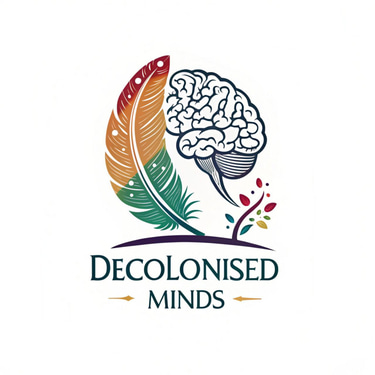Reclaiming Narratives: The Power of Storytelling in Healing
Explaining why Reclaiming Narratives practice is central to decolonised psychotherapy.
By Talha AlAli, Founder of Decolonised Minds
1/22/20252 min read
Storytelling has long been a cornerstone of human culture, serving as a means to share knowledge, preserve traditions, and connect communities. In the realm of psychotherapy, storytelling takes on a profound therapeutic significance. Reclaiming personal and cultural narratives can empower individuals and communities to process trauma, rediscover suppressed identities, and foster resilience. This practice is central to decolonised psychotherapy, which seeks to honour diverse cultural traditions and histories often marginalised by mainstream therapeutic approaches.
Narrative Therapy Techniques in Healing
Narrative therapy is a collaborative approach that helps individuals externalise their problems and reframe their stories in ways that align with their values and aspirations (White & Epston, 1990). By viewing problems as separate from the person, clients can gain perspective and agency. For example, a client struggling with intergenerational trauma might reframe their narrative from being a passive recipient of pain to a resilient survivor reclaiming their history.
Incorporating cultural storytelling within narrative therapy adds another dimension. Many cultures, particularly Indigenous and colonised communities, rely on oral traditions to pass down stories that embed lessons, identity, and collective memory. For instance, Indigenous storytelling often connects individuals to their ancestors, lands, and spiritual beliefs, fostering a sense of belonging and purpose (Gone, 2013). Such cultural narratives can serve as a powerful tool for healing, especially for those disconnected from their roots due to colonialism or forced migration.
Reconnecting with Suppressed Histories and Identities
Colonial histories have often silenced or distorted the narratives of marginalised communities, leading to collective trauma and identity suppression. Reclaiming these narratives is a critical aspect of healing, allowing individuals to validate their experiences and challenge dominant discourses that perpetuate systemic oppression (Comas-Díaz, 2016). This process can be transformative, enabling people to reimagine their roles within their families, cultures, and societies.
Cultural Storytelling as a Therapeutic Tool
Incorporating cultural storytelling into therapy bridges the gap between traditional practices and modern psychological techniques. Practices such as African griot storytelling, Indigenous song cycles, or Irish seanchaís (oral histories) not only preserve cultural knowledge but also affirm clients’ identities within their cultural frameworks (Kirmayer et al., 2011). Therapists who integrate these methods into their work demonstrate cultural humility and create a space where clients feel seen and valued.
Conclusion
Storytelling is a powerful medium for healing, offering individuals and communities the opportunity to reclaim their narratives and reconnect with their identities. By incorporating narrative therapy techniques and cultural storytelling traditions, therapists can foster resilience, empowerment, and connection. For marginalised groups, reclaiming suppressed histories through storytelling is not just therapeutic—it is an act of resistance and self-determination.
________________________________________
References
• Comas-Díaz, L. (2016). Racial trauma recovery: A race-informed therapeutic approach to racial wounds. The Counseling Psychologist, 44(2), 218–232.
• Gone, J. P. (2013). Redressing First Nations historical trauma: Theorising mechanisms for Indigenous culture as mental health treatment. Transcultural Psychiatry, 50(5), 683–706.
• Kirmayer, L. J., Gone, J. P., & Moses, J. (2011). Rethinking historical trauma. Transcultural Psychiatry, 51(3), 299–319.
• White, M., & Epston, D. (1990). Narrative means to therapeutic ends. Norton.
